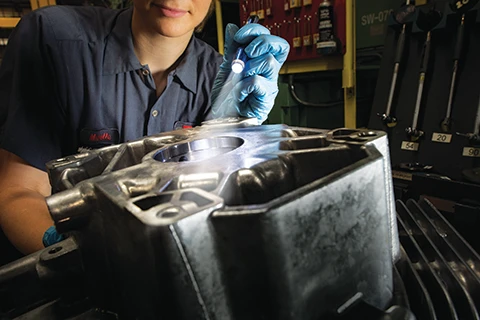
Little attention, long life
Taking basic steps to perform small engine maintenance can extend the time your equipment runs at full throttle.
By Catherine Pomiecko
 Even the most minute parts of your small engines can have a big impact on your business. By investing the small amount of time and money it takes to stay on top of maintenance for those components, contractors can see big payoffs when equipment downtime is reduced and many costly repairs are prevented.
Even the most minute parts of your small engines can have a big impact on your business. By investing the small amount of time and money it takes to stay on top of maintenance for those components, contractors can see big payoffs when equipment downtime is reduced and many costly repairs are prevented.
Get on a schedule. Finding the time for routine maintenance can be difficult and tedious for many contractors. But checking things like engine oil, oil filters, air filters and cooling fins on a regular basis can help significantly extend the life of your machine. One surefire way to stay on track is to document services and get your equipment on a schedule.
Nick Kamataris of Kamataris Landscape & Lawn Care in Ashland, Mass., personally oversees the maintenance logs for his company. Whenever his machines are serviced, Kamataris marks the date and the hour meter for each engine in an Excel spreadsheet to help him track when they are due for their next oil change. Then, much like a mechanic noting an oil change in a car, he writes the date of the oil change directly on the filter.
“We try to take as many small steps as possible to maximize the life of the engines since we spend such a large amount of money on them,” he says. “I try to preach to my guys that in the five minutes it takes to check these machines every morning, it’s going to save us thousands of dollars in the long run.”
Every day, Kamataris’ crew checks the oil and cleans out the air filters, letting him know if either needs attention ahead of the machine’s regularly scheduled maintenance. In New England, the environmental conditions at the beginning of the year and in the late summer create a lot of dust, which makes frequently checking air filters and cooling fins for buildup a crucial component of the maintenance routine.
“The dust is the No. 1 thing that kills these engines,” he says. “In our climate, blown head gaskets are one of the biggest problems, and that comes from not checking the air filter or blowing out the cooling fins on the side of the engine. It’s all stuff that takes five or 10 more minutes between lawns.”
One way contractors can build maintenance checks into their workflow and be proactive about servicing their machines is to regularly wash their equipment, says Jamie Carncross, equipment manager at ProScapes in Jamesville, N.Y. Every one or two weeks, his crew members bring their machines up to the shop, wash them, and let Carncross and his team know if they’ve noticed any issues.
“Washing the equipment highlights things that are starting to fall apart,” he says. “The grit sticks to the machine and helps wear parts out. Sometimes when things go bad, they take unrelated parts with them. If you can catch it and repair it before it actually fails, you can improve your up time because you can schedule the repair.”
 Don’t skimp on the oil. It might be tempting to try to save a few dollars on cheap oil, but this simple element is crucial to the overall performance of the machine and its quality really makes a difference.
Don’t skimp on the oil. It might be tempting to try to save a few dollars on cheap oil, but this simple element is crucial to the overall performance of the machine and its quality really makes a difference.
“One thing that you can’t do is try to save money on purchasing oil,” Carncross says. “That’s what makes the machines live or die. You think of a lawn mower, and it has about a quart of oil in there, and you’re depending on that tiny amount of fluid to do a tremendous job. So that’s the worst place in the world to try and save money. You can’t go to your local discount store and buy whatever is on sale and expect good results. It doesn’t make any sense if you think about what you’re asking these lubricants to do.”
Just like the time it takes to perform regular maintenance checks, purchasing a good quality oil may cost more upfront, but will pay off in the long run as it builds in some protection to fall back on when maintenance gets behind schedule. Carncross expects to get 3,000 hours out of an engine, but often sees more than that. He attributes this in part to the high quality lubricants he buys.
“As an industry, we are kind of relentless on this equipment, and you have to get whatever type of protections you can,” he says. “The only variables that you really have are the oils. It’s not just a fluid that you pour in and change periodically. It provides a function.
“The highest quality stuff you can buy and use is going to pay off tenfold over the life of a machine because that’s your protection. They shouldn’t call it lubricant, they should call it protectant. I base my maintenance program around the lubricants and I think it pays off completely.”
For Brad Robinson of Total Lawn & Landscape in Maryland, most problems revolve around clogged air filters or oil that hasn’t been properly checked. The rest chalks up to human error.
“We’ve never lost a motor to wear and tear,” Robinson says. “Most everything is oil – the guys didn’t check the oil and they burn it up, or they jump off the machine when its running full throttle to pick up a piece of trash and the motor is sitting there running at full throttle and is not picking the oil up. It doesn’t cost anything to change the oil compared to what you’re saving knowing the machine is going to start and run every time.”
Engines vs. machines. While taking preventative maintenance measures can mitigate many problems, some issues are inevitable. Whether due to damage or old age, eventually engines will need to be replaced. Contractors should weigh their options when it comes to replacing the motor versus replacing the entire machine. Robinson opts to salvage as much as possible and replace just the motors for his equipment. He credits improvements in machine design and quality for the ability to do so.
“I believe that they are making these machines well enough, and most parts of the machine revolve around the engine,” he says. “We can always replace tires, hydro motors and spindles. As long as the frame is in good shape, we just replace the motor. We have a couple walk behinds that are 15 years old and on their second motor. We would only think about changing a machine out when you start losing parts outside of the motor that are in excess of $1,000.”
The cost and time to replace an engine often beats the cost of buying an entirely new machine. But sometimes, the benefits of newer models and new warranties may tip the scales in the other direction. Kamataris often replaces the entire machine when his engines go. He considers factors like new features of the latest equipment models, improvements in gas mileage and emissions systems and all of the cost savings for the parts that would be covered under a new warranty.
“We keep track of the money right down to the nickel, so we are always looking for ways to save money,” he says. “Anytime we go to buy a new machine or we run into a problem where we need anything new, we’re always running a cost analysis to see what’s going to make the most sense for us as a business.”
The author is a freelance writer based in Louisville, Ky.
Motor math
Lawn & Landscape surveyed more than 400 contractors about their views on maintaining, repairing and buying engines. Most respondents were smaller contractors with gross revenue less than $200,000, who maintain their own engines (56%) and who wait more than two years to replace small engines in mowers (84%). We’ll be posting more results from this survey in future issues of Lawn & Landscape.

More maintenance tips
For more on engine maintenance and additonal survey results, follow #smartyourengine on Lawn & Landscape’s and Kawasaki Engine’s Twitter and Facebook feeds.

Explore the September 2015 Issue
Check out more from this issue and find your next story to read.
Latest from Lawn & Landscape
- Bartlett Tree Experts gave away 50,000 tree seedlings for Arbor Day
- Connect, Control & Conserve with Horizon Technical Services
- Use Horizon's Parts Hotline
- How I built a Top 100 company
- Horizon’s Exclusive TurfGro Fertilizer
- Grow your business with mosquito control
- LandCare adds 2 branches in SoCal, promotes Aleman to branch manager
- Spray them away





